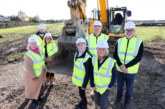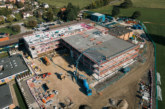A leading lighting manufacturer has called on the industry to ‘seize the opportunity for change’ in order to ensure building safety is a top priority.
With the announcement of the Building Safety Bill, Tamlite Lighting says whilst the safety of buildings, and the people occupying them, has reached an ever-higher profile in the public consciousness, more work still needs to be done across the supply chain to guarantee greater consistency in the design and construction quality of buildings.
A fire at New Providence Wharf in London earlier this year, and the recent revelation of the number of buildings in London on ‘waking watch’, highlights the need for change to be embraced. In giving evidence to the London Assembly, London Fire Brigade commissioner Andy Roe revealed that 901 buildings in the capital are currently on a waking watch but that the number “continues to grow”. The commissioner revealed that whilst a majority are due to unresolved cladding issues, the remainder are due to other fire safety defects such as fixed installations not working.
Tamlite Lighting’s Technical Manager Stephen Biggs says it is incidents like this that highlights the importance of everybody in the supply chain working together to make way for a safer future.
“The Building Safety Bill easily represents the most sweeping change to building safety in the last 40 years, and we hope that it has a much-needed positive impact on the specification process. Sadly, as we have seen over the past couple of months, there are too many incidents where vital building safety systems are not fit for purpose. To ensure Government legislation reaches its full potential, the industry must seize this opportunity for change” said Stephen.
Stephen continued: “As a leading lighting manufacturer, we see it as vital that we show leadership in raising awareness of the scope and importance of the Building Safety Bill, particularly when it comes to emergency lighting specification. Given the essential role it plays in providing a clear exit path and vital time for the safe passage of occupants evacuating a building in the event of a fire, it would be easy to assume that it is a de-facto priority. Regrettably, it has often been an area that has fallen victim to spec-breaking and needless ‘economy’.
“More than ever, making the case for the long-term benefits of higher-end solutions is going to be critical — we can no longer aim for minimum compliance to get the job done. To ensure change is embraced throughout the life cycle of a building, we will continue to work hard to communicate the case for quality, and we will always help end users see the added value in our higher-specification products and solutions.
“There is no doubt that it will take some years for the public in general to feel confident about the safety of buildings. But collectively we can all play a key role in constructing a culture of responsibility, providing the way forward to a brighter, safer future.”









